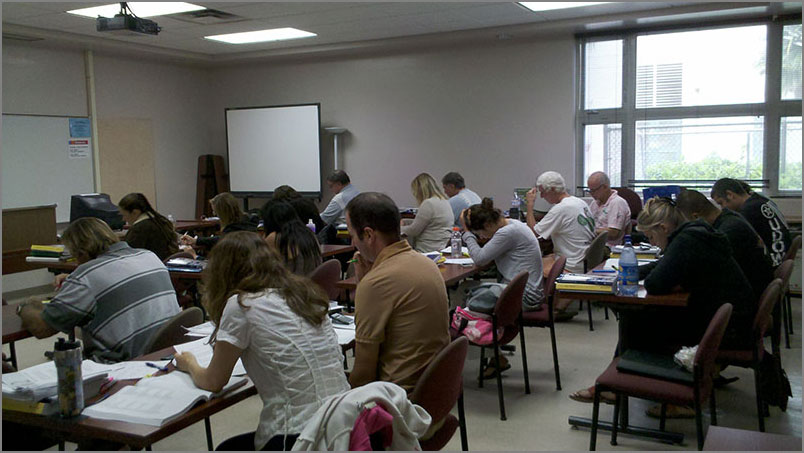Real Estate School Alumni Share Their Lessons Learned}
What Courses Are Readily Available at a Real Estate Institution? A Full Guide for Aspiring Representatives
Hopeful realty agents have a varied range of programs available to boost their knowledge and skills. These offerings vary from foundational classes in realty principles to specialized training in locations like home administration and business property. Understanding the different educational courses can be important for success. What crucial subjects and approaches will these programs cover, and exactly how might they shape a representative's profession?
Recognizing the Essentials: Property Principles
The structure of property knowledge hinges on recognizing its concepts. These principles incorporate important ideas that regulate the purchasing, marketing, and administration of properties. Trick subjects consist of residential property ownership, land usage, and the various civil liberties associated with ownership. Comprehending the differences in between property, commercial, and industrial residential properties is important, as each category has distinct market characteristics.
Additionally, trainees discover market evaluation, which includes assessing residential property worths and fads to make educated decisions (Real Estate School). Genuine estate concepts also cover the relevance of contracts and the legal framework that supports realty transactions. Experience with financing alternatives, such as home loans and loans, is crucial for directing the financial elements of genuine estate. On the whole, a solid grasp of these concepts furnishes hopeful representatives with the foundational knowledge needed to prosper in the competitive genuine estate industry, leading the way for more specialized training and licensing

Licensing Requirements and Examination Prep Work
Aspiring realty representatives need to navigate particular licensing demands to practice legally in their corresponding states. These demands typically include finishing a designated number of hours in pre-licensing education and learning, which covers important topics such as realty law, values, and residential or commercial property monitoring. Prospects should likewise pass a state assessment that evaluates their expertise and understanding of these subjects.
Examination prep work is essential for success. Several real estate schools provide examination prep programs that give practice concerns, research overviews, and evaluation sessions. These resources assist prospects acquaint themselves with the test layout and web content. In addition, signing up with study hall or utilizing online systems can boost finding out with collective testimonial and conversation.
When the examination is passed, representatives have to request their certificate via the state's real estate commission, usually accompanied by background checks and fees. Meeting these licensing requirements guarantees that agents are equipped to offer clients efficiently and fairly in the genuine estate market.
Specialized Courses: Residential Property Monitoring
Understanding the intricacies of property administration is necessary genuine estate specialists looking for to boost their competence in this specific area. Residential property monitoring training courses supply agents with valuable understandings into the day-to-day operations of managing industrial and residential homes. These courses typically cover crucial subjects such as lessee relations, lease contracts, and property upkeep.
In addition, aspiring residential property managers discover monetary monitoring, including budgeting and rent out collection methods, along with lawful responsibilities associated with occupant civil liberties and building guidelines.
Courses may additionally discover advertising and marketing techniques for bring in lessees and devices for building management software application that improve operations. By finishing specialized home monitoring courses, property professionals can much better furnish themselves to deal with the obstacles of handling properties successfully, eventually resulting in improved client fulfillment and business development. This expertise is essential for those aiming to master the competitive realty market.
Industrial Realty: A Different Point of view
Commercial property operates under special market characteristics that differentiate it from houses. Recognizing financial investment techniques certain to this sector is vital for success, as is acknowledging the relevance of networking possibilities available to specialists. These components together shape an all-inclusive approach to going across the complexities of commercial real estate.
Special Market Characteristics

Investment Techniques Discussed
Countless financial investment approaches exist within the domain of business realty, each customized to meet particular monetary objectives and market problems. One usual technique is value-add investing, where capitalists get underperforming buildings, boost their worth via renovations, and subsequently raise rental earnings. An additional strategy is core investing, concentrating on maintained, high-grade properties in prime places that provide constant cash money circulation. Additionally, opportunistic investing entails higher threat, targeting residential or commercial properties needing significant redevelopment or in arising markets. Realty investment company (REITs) provide an extra easy method, allowing people to invest in a diversified portfolio of business homes. Lastly, crowdfunding platforms have emerged, allowing tiny financiers to take part in bigger business deals, democratizing access to the industrial genuine estate market.
Networking Opportunities Available
In the domain of realty investing, building a robust expert network can significantly boost opportunities for success. Networking chances are plentiful at actual estate schools, where hopeful agents can connect with market specialists, instructors, and fellow students. Workshops, seminars, and visitor lectures commonly include seasoned agents and brokers that share understandings and experiences, giving very useful contacts. Numerous colleges also facilitate regional meetups and networking occasions, motivating pupils to involve with the broader realty community. Furthermore, on-line systems and discussion forums connected with these programs permit recurring communication and collaboration. By leveraging these chances, students can cultivate partnerships that might look at here lead to mentorship, partnerships, and possible task placements, inevitably assisting in their professional advancement within the competitive commercial property market.

Realty Investment Strategies
Actual estate financial investment strategies visit differ considerably, including methods such as rental building financial investments, turning houses, and involving with Realty Investment Company (REITs) Each technique presents one-of-a-kind chances and threats that financiers must meticulously take into consideration. Understanding these alternatives is vital for anyone looking to construct a successful property profile.
Rental Residential Property Investments
Numerous capitalists find rental residential or commercial property investments to be a compelling approach for constructing wealth and producing easy revenue. This method entails purchasing industrial or property properties to lease to lessees, guaranteeing a constant capital. Successful rental residential or commercial property investments call for comprehensive marketing research, reviewing building worths, and understanding local rental demand. Investors commonly take advantage of tax obligation benefits, such as depreciation and home mortgage passion reductions. Furthermore, home administration skills are crucial for keeping occupant partnerships and making sure timely lease collection. Long-lasting gratitude of property worths can additionally boost an investor's profile. Overall, rental property investments can give a steady income and add to financial safety and security, making them an attractive choice for numerous in the property market.
Turning Homes Techniques
Turning houses has become a prominent approach genuine estate investors looking for quick returns on their financial investments. This method entails buying undervalued properties, making needed renovations, and marketing them at a higher rate. Successful house flippers generally carry out extensive marketing research to recognize promising areas and homes with possibility for recognition. They frequently concentrate on cosmetic upgrades, such as bathroom and kitchen remodels, to enhance allure without spending beyond your means - Real Estate School. In addition, comprehending financing alternatives and managing budgets are vital for taking full advantage of profits. Time is essential in this method, as prolonged renovations can Website wear down revenue margins. Eventually, turning houses calls for a blend of market understanding, remodelling skills, and financial acumen to be effective in an affordable realty landscape
REITs and Diversity
Although direct property investment can generate high returns, Real Estate Investment Company (REITs) offer a compelling alternative that allows financiers to diversify their portfolios without the intricacies of managing physical buildings. REITs are business that own, run, or financing income-producing property throughout numerous markets, consisting of household, business, and industrial homes. By purchasing REITs, people can acquire direct exposure to realty markets without the demand for considerable funding or direct monitoring responsibilities. This financial investment automobile additionally gives liquidity, as shares can be quickly gotten and marketed on stock market. Additionally, REITs often pay returns, offering a normal income stream. On the whole, incorporating REITs right into a profile can boost diversity and minimize risks connected with traditional residential or commercial property investments.
Proceeding Education And Learning and Expert Development
As the genuine estate market develops, experts need to engage in proceeding education and learning and professional development to remain competitive and educated. This recurring learning is vital for adjusting to changes in legislations, technology, and market patterns. Property institutions offer various programs made to boost skills and expertise, consisting of advanced arrangement strategies, home administration, and marketing techniques.
Numerous states need accredited representatives to complete a collection variety of proceeding education hours to keep their licenses. These courses often cover fundamental topics such as principles, fair housing regulations, and threat administration.
Additionally, industry workshops and seminars give networking opportunities, permitting representatives to get in touch with peers and sector leaders. By participating in these curricula, realty experts can guarantee they continue to be proficient and receptive to client demands, inevitably bring about occupation growth and success in a vibrant market.
Regularly Asked Concerns
What Is the Typical Duration of Realty Courses?
The normal duration of realty courses differs, usually varying from a few weeks to a number of months. Variables influencing this duration include program material, distribution technique, and state demands, influencing hopeful representatives' instructional timelines.
Are Online Courses Available for Real Estate Education?
Yes, countless on-line courses are available for actual estate education and learning. These programs supply versatility and access, enabling individuals to find out at their own rate while covering crucial subjects necessary for acquiring genuine estate licenses and understanding.
Exactly How Much Do Real Estate Courses Generally Cost?
Property courses generally vary from $200 to $1,500, depending upon the establishment and program length. Added costs for materials, examinations, and state licensing may also apply, adding to the general price of education and learning.
Can I Take Realty Courses Part-Time?
Yes, people can take property training courses part-time. Lots of schools supply adaptable scheduling alternatives, allowing aspiring agents to balance their studies with other commitments, making it available for those with hectic way of lives.
What Jobs Can I Seek After Completing Realty Courses?

These offerings vary from fundamental courses in real estate principles to specialized training in areas like property monitoring and industrial genuine estate. Real estate principles likewise cover the significance of agreements and the legal framework that supports actual estate transactions. While several genuine estate professionals concentrate on household markets, the characteristics of commercial actual estate existing distinct difficulties and chances that call for a different approach. Genuine estate investment techniques differ significantly, encompassing approaches such as rental property financial investments, turning homes, and involving with Real Estate Investment Counts On (REITs) Straight home financial investment can yield high returns, Real Estate Financial Investment Trust Funds (REITs) supply a compelling choice that enables financiers to expand their portfolios without the complexities of taking care of physical homes.